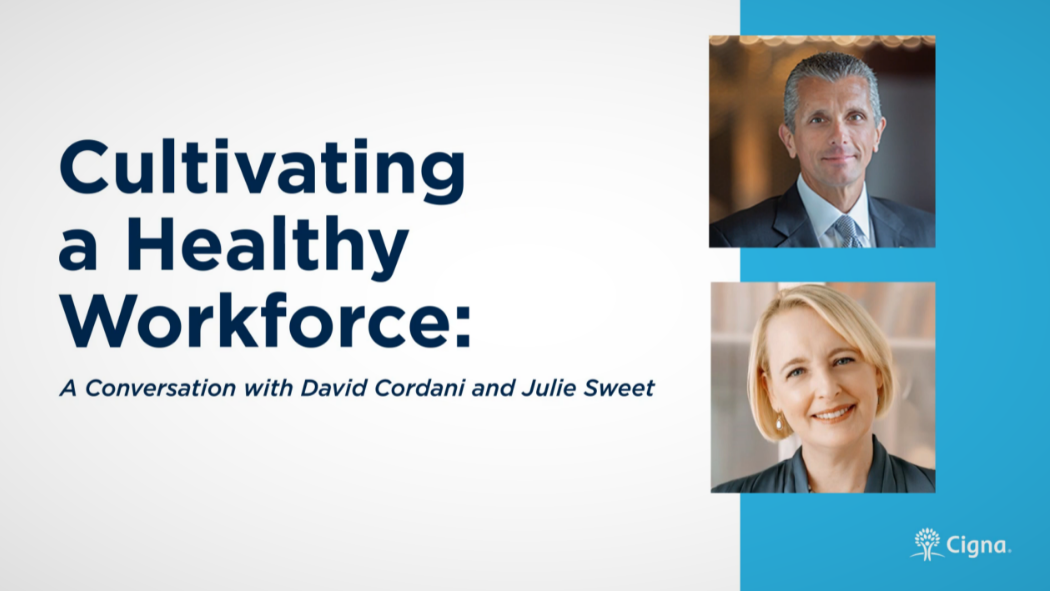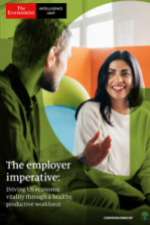
Modern, forward-thinking companies have one thing in common: They are committed to fostering a healthy workforce, with a special eye towards building a culture of belonging and well-being.
Research by the Economist, which was sponsored by Cigna, suggests that 80% of employees are feeling burnout, stress and strain. The research also found that healthy employees are more productive, and businesses with productive employees generate more revenue, broader economic growth and community vitality.
That was the topic of conversation between Cigna President and CEO David Cordani, and Accenture Chair and CEO Julie Sweet, who recently sat down to discuss the future of work and why employee experience must be rooted in health and well-being. You can watch the video of their discussion, below.
Read on for some of the talking points about the impact that health and well-being has on businesses as well as how to foster a healthy workforce. (Editor’s note: The interview has been edited for length and clarity.)
Cordani: We know as two large global corporations, our colleagues around the globe are dealing with challenges from this once-in-a-lifetime pandemic. What are you seeing amongst your employees and how has Accenture stepped forward under your leadership to support your team?
Sweet: Let me start with a very simple fact. We have 624,000 employees, and we've had over 180,000 of those people [participate] in a program called, “Thriving Mind,” which we brought to our people to help train them about the science of stress and how to relieve it. And that is just an extraordinary take up.
This is a voluntary program and when we introduced it before the pandemic, we never had any idea that it would reach that many people. …We are all feeling the challenges and the stress. …I believe [we are witnessing] a permanent shift in mindset around employers and their role in health and well-being.
Cordani: You talked about “Thriving Minds” and you had the foresight and leadership to bring that to your colleagues before the pandemic manifested itself. Tell us a little bit more about what stimulated you back then in 2019, before the present environment, to [understand] your colleagues would benefit from a program like that.
Sweet: For me, there's a personal journey that started when I was running our North America business about three years ago. We were starting to focus more on invisible disabilities – depression being one of them. I hosted a broadcast to talk about these topics and things like depression and I received a phone call [from] a woman that I worked with for years. I knew her well. [She] was high-performing, and does so much in our community at Accenture. She shared with me that she had suffered for years with severe depression. She thanked me for talking about it in this webcast because she never had the confidence … to share that with [anyone]. It really made a mark on me.
…When I became CEO, I worked with our chief leadership and human resources officer to say that we really needed to do more given our scale, to [introduce] preventative tools. …We'd already had a relationship with Thrive, [but now] we wanted to do something at scale. And that's how we started with the “Thriving Mind” program.
Cordani: …Research from The Economist [and Cigna] reinforces that 90% of people believe that employers who invest in health and well-being will come out of the pandemic stronger than [those who do not]. What else have you seen in your organization as it relates to well-being during the pandemic, and the ability for your colleagues to thrive in this challenging environment? How do you see that affecting your business going forward?
Sweet: [At Accenture we have certain characteristics we look for in leaders] – we call [them] leadership essentials. One of them is that we look for leaders who care deeply about our people, both professionally and personally. [Employee well-being] starts with a decision about what leadership at a company is. When the pandemic happened, we started with that basic leadership principle … of care.
…If you look to India where we have over 200,000 employees – understanding our people in India is to understand many of them live with extended families. Many of them don't have the access that we would have here in the U.S. to health care. And so when the pandemic started, we made changes like providing benefits to extended family members, that didn't exist before the pandemic. We made available to them home health care kits, not just to our employees, but to their family members.
And I just want to thank you at Cigna [for] being an amazing partner, because not only did you help along the way, but when the surge happened just several months ago [in India], we called you. …[We said] we're going to need telehealth [for employees in India], because the health care system is becoming overwhelmed. And within 24 hours, you had actually provided that. And so we are so incredibly appreciative.
…And we can do that as employers. We can use our leverage and our partnerships to provide those kinds of benefits and it absolutely translates into performance. We had no bumps in our financial results or in our client service, despite the extraordinary challenges our people faced in India. And I truly believe that it started with our view that we have to care about our people personally, we have to think about their well-being, and that we had to use our own resources, scale and partnerships to ensure that we're taking care of our people.

The Employer Imperative: Driving US Economic Vitality Through a Healthy, Productive Workforce
Research from the Economist/Cigna finds employers are the key to linking employee health and productivity, business success, and overall economic vitality.
Cordani: [Talk to me about] the power of personal communication with your colleagues. [What were] some of your communication and engagement tools and style within the organization over the last 18 months?
Sweet: …One of the bright sides to the pandemic is it has built deeper connections, when you know that [a colleague] has a dog. …We've been connected in a way that we never would have … so I think that's one of the enduring changes. …[At] Accenture, we've made changes to make sure that when we say we're focusing on well-being that we walk the walk. I'll give you a great example. A couple of quarters ago, we were getting ready for my quarterly … managing directors call. [We have about 9,000 managing directors.] And, I was talking to our CHRO.
…When we looked at our data, and anecdotally at how we were feeling, we [realized] our managing directors – who were asking [about how] to care for our people – need to care for themselves more. And we were seeing that in how much they were working out of [regular office] hours and so on.
And so we actually just threw out the entire playbook. When we got on [the call] we said, "We're not going to tell you about what you're going to need to deliver this quarter.” …[Instead] we had Arianna Huffington come on to work through micro-practices and how we deal with stress … and it … made everyone feel like it is okay. The CEO's feeling it, and other people were feeling it.
Then we actually did something super practical. We let people who had an hour in their calendar [dedicated to learning about] what sales they had to do and what new offering we had to have, to spend that hour just focusing on themselves. And I don't know that we would have done that before. I don't know that we would have been as aware as opposed to simply saying, "Hey, care for yourself."
We're continuing to evolve as an organization – even in just how we connect with people. We're hiring a lot of people. We hired 54,000 people last quarter. And we're thinking … differently about how they connect [both in a] physical and digital [sense] … a term [we call] “phygital.”
When you start a new job, you go to a new place [and] its exciting because you meet new people and you see the place. Well, none of that's happening right now. And so we really thought about how do we connect with them differently? …They now get a box that has little posters in it, like they would have seen in the office, and Accenture swag. But it started with caring about the experience of our people. …And again, that's an evolution that is different than before the pandemic. [We now have an] absolute focus on an employee's experience, which is part of their well-being. Feeling connected to the new place is going to make them more comfortable to reach out for help, and to build the relationships that we know are part of resilience.